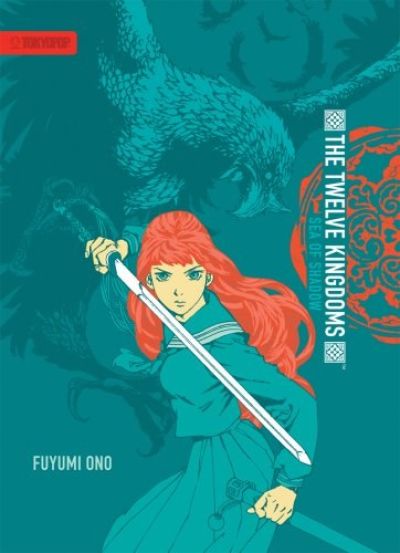Once in a Lullaby
Sea of Shadow (The Twelve Kingdoms, volume 1)
By Fuyumi Ono

10 May, 2017
0 comments
1992’s portal fantasy Sea of Shadow is the first volume in Fuyumi Ono’s Twelve Kingdoms series. The 2007 English language edition was translated by Alexander O. Smith, and Elye J. Alexander.
Yoko Nakajima’s oddly coloured hair, lighter than any proper Japanese person’s hair should be, makes her an object of suspicion to her parents and schoolmates. It’s true that her hair has been its present colour since birth, and that she is to all appearances a normal, hardworking student and dutiful daughter. But isn’t that just the sort of facade a covert nonconformist would adopt? Her reluctance to assimilate by dying her hair black only underlines here oddity. Although if she did colour her hair, that would also be bad (her school forbids hair-colouring [1]).
But things could get worse, and do. Accosted by a stranger, given a magic sword and the ability to use it, attacked by monsters, Yoko is transported from Japan to the strange world of the Twelve Kingdoms.
Although Yoko has never heard of the Twelve Kingdoms, the people of the Twelve Kingdoms are familiar with visitors from Japan. They call the visitors — or rather, unwilling immigrants, since none of them ever return home—Kaikyaku. The kingdom of Kou fears them as potential harbingers of disaster, prudently imprisoning or executing any who fall into officials’ hands. Rather than enjoy Kou’s dubious hospitality, Yoko flees into the countryside.
Yoko finds herself wandering a dangerous land, where no stranger can be trusted and monsters lurk everywhere. Worse yet, the monsters seem determined to hunt down the fleeing exile. Her sword and her new skill with it, not to mention her magical powers of healing, let her fight off the monsters off … for the moment. But how long can she hold out alone?
Survival requires finding allies she can trust. She must also face up to an unwelcome truth: she was never an ordinary mortal girl and she is unlikely to return home.
~oOo~
This is yet another work of SFF wherein the plot would have unspooled in a very different fashion if only certain people had thought to prepare and distribute info to the magically endowed and transported. Even a short pamphlet would have helped poor Yoko.
It was interesting reading this right after I plowed through several Prometheus Award nominees, because in many ways this is a book designed to drive Libertarians up the wall. We are told that there is no such thing as luck in the Twelve Kingdoms, that the gods don’t take an interest in individuals, and that success is entirely merit-based. Hence many people of the Twelve Kingdoms (or at least Kou) have reached the conclusion that it is every person for themselves. Naïve strangers may well find themselves sold into brothels … a fate Yoko barely escapes. So much for libertarian paradises (like Somalia ).
One might think that these flaws are somewhat ameliorated by the odd mechanism for choosing the kings of Kou. Magical beings called kirin scour the kingdom, looking for those of high merit (in a Confucian sense: wise and morally impeccable) to become king. Alas, the sort of people most likely to be drafted as rulers are also the sort of people who are most likely to find power a burden. Those who revel in their power soon lose the mandate of heaven, which has deleterious consequences, for the kings and for their unfortunate subjects. Whoever is king is doomed to endless work, worry, and premature grey hair. Or deleterious consequences.
Who can blame the antagonist for hating the system and wanting to bring it down? Aside from all their victims, that is?
In Yoko’s case, not only is she recruited by without proper instructions, but through no fault of her own, she is stuck with a terrible dilemma. If she accepts the kingly role, she will never see her parents again. If she turns it down, thousands in the Twelve Kingdoms will suffer (not all of whom are amoral monsters [2]). Still, having to choose between undesirable alternatives is basically what becoming an adult is all about.
Yoko already fears that she has become a bit of a monster herself. Her magic sword and new martial skills make slicing enemies in two as much easy fun as a round of Candyland. If she chooses to reject the crown, perhaps she is making a choice only a monster would make.
Tokyopop’s edition of this manga is uninspired. The title is emblazoned on the cover in thrilling low contrasl, easy to overlook on the bookshelves. Given Tokyopop’s troubled history (and the fact Japanese publisher Kodansha yanked the rights for this and other works years ago), I suspect that many readers never noticed this book, which is a pity. Despite the presentation problems, it’s a fun read.
Sea of Shadow is available here (Amazon) (although I expect used copies only). It is not available from Chapters-Indigo.
Please send corrections to jdnicoll at panix dot com
1. Editor’s footnote: a friend of mine once taught at a small residential college in Japan. He said that it was easy to spot the frosh on campus, because they frequently celebrated their newfound freedom (away from parents, attending a less restrictive school) by dyeing their hair.
2: It seems to be me that even the demons might not be non-stop monsters. One scene makes it clear they are subject to another person’s control.
